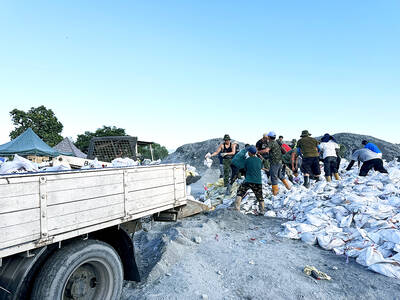Scores of activists protested in front of the Department of Health yesterday to show their opposition to an anticipated full opening of Taiwan’s market to US beef.
The protesters urged the government to hold public hearings before making a final decision.
After learning from reports that the government is preparing to ease restrictions on US beef imports, activists from a number of civic groups said that the government should not sacrifice the public’s health for the sake of political and economic benefits.
The government currently only allows the import of boneless beef from cattle under 30 months of age, but may lift or ease the constraints under intense lobbying from the US government.
Likening opening the market to US beef exports to arms procurement, Green Party Taiwan Spokesman Pan Han-shen (潘翰聲) said that both involve politics and that the government should not put public health at risk for short-term gains, including the possibility of negotiating and signing a Taiwan-US free-trade agreement.
Hu Ya-mei (胡雅美), president of the Homemakers’ Union and Foundation, said that prion proteins, the agents that cause bovine spongiform encephalopathy (BSE), or mad cow disease, are not easily killed by cooking or ultraviolet rays and can survive in any part of an infected cow, posing a hazard to human health.
The best way to stay safe, Hu said, is a full ban on US beef imports.
The groups demanded that the Department of Health hold public hearings before making a decision on whether to relax or tighten restrictions on US beef imports and urged that all beef and beef-related products should be labeled with the place of production and a risk warning.
Taiwan banned US beef in 2003 when a case of mad cow disease was diagnosed in Seattle.
The ban was lifted in 2005 to allow imports of US deboned beef from cattle aged under 30 months, but the government reimposed a complete ban two months later when a second BSE case was discovered in the US.
In 2006, the government agreed to allow beef imports once again, but limited imports to boneless beef from cattle younger than 30 months of age produced by certified slaughterhouses.
Over the past three years, beef imports from the US have increased annually and the US now supplies around 32 percent of Taiwan’s beef, with the rest coming mainly from New Zealand and Australia.

Taipei, New Taipei City, Keelung and Taoyuan would issue a decision at 8pm on whether to cancel work and school tomorrow due to forecasted heavy rain, Keelung Mayor Hsieh Kuo-liang (謝國樑) said today. Hsieh told reporters that absent some pressing reason, the four northern cities would announce the decision jointly at 8pm. Keelung is expected to receive between 300mm and 490mm of rain in the period from 2pm today through 2pm tomorrow, Central Weather Administration data showed. Keelung City Government regulations stipulate that school and work can be canceled if rain totals in mountainous or low-elevation areas are forecast to exceed 350mm in

The Central Emergency Operations Center (CEOC) has made a three-phased compulsory evacuation plan for Hualien County’s Mataian River (馬太鞍溪) disaster zone ahead of the potential formation of a typhoon. The plan includes mandatory vertical evacuation using air-raid-style alarms if needed, CEOC chief coordinator Chi Lien-cheng (季連成) told a news conference in the county yesterday. Volunteers would be prohibited from entering the disaster area starting tomorrow, the retired general said. The first phase would be relocating vulnerable residents, including elderly people, disabled people, pregnant women and dialysis patients, in shelters and hospitals, he said. The second phase would be mandatory evacuation of residents living in

EVA Airways president Sun Chia-ming (孫嘉明) and other senior executives yesterday bowed in apology over the death of a flight attendant, saying the company has begun improving its health-reporting, review and work coordination mechanisms. “We promise to handle this matter with the utmost responsibility to ensure safer and healthier working conditions for all EVA Air employees,” Sun said. The flight attendant, a woman surnamed Sun (孫), died on Friday last week of undisclosed causes shortly after returning from a work assignment in Milan, Italy, the airline said. Chinese-language media reported that the woman fell ill working on a Taipei-to-Milan flight on Sept. 22

COUNTERMEASURE: Taiwan was to implement controls for 47 tech products bound for South Africa after the latter downgraded and renamed Taipei’s ‘de facto’ offices The Ministry of Foreign Affairs is still reviewing a new agreement proposed by the South African government last month to regulate the status of reciprocal representative offices, Minister of Foreign Affairs Lin Chia-lung (林佳龍) said yesterday. Asked about the latest developments in a year-long controversy over Taiwan’s de facto representative office in South Africa, Lin during a legislative session said that the ministry was consulting with legal experts on the proposed new agreement. While the new proposal offers Taiwan greater flexibility, the ministry does not find it acceptable, Lin said without elaborating. The ministry is still open to resuming retaliatory measures against South